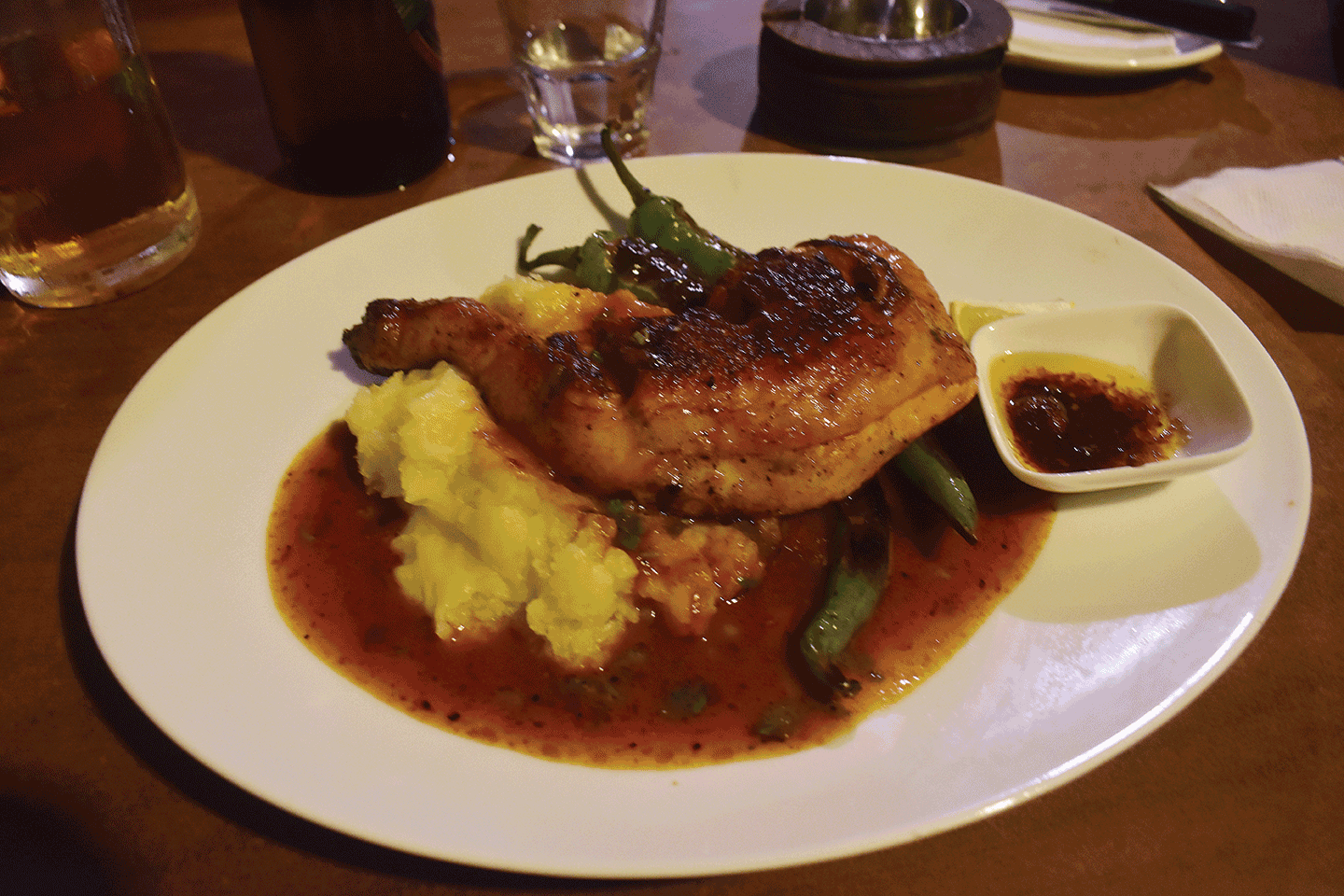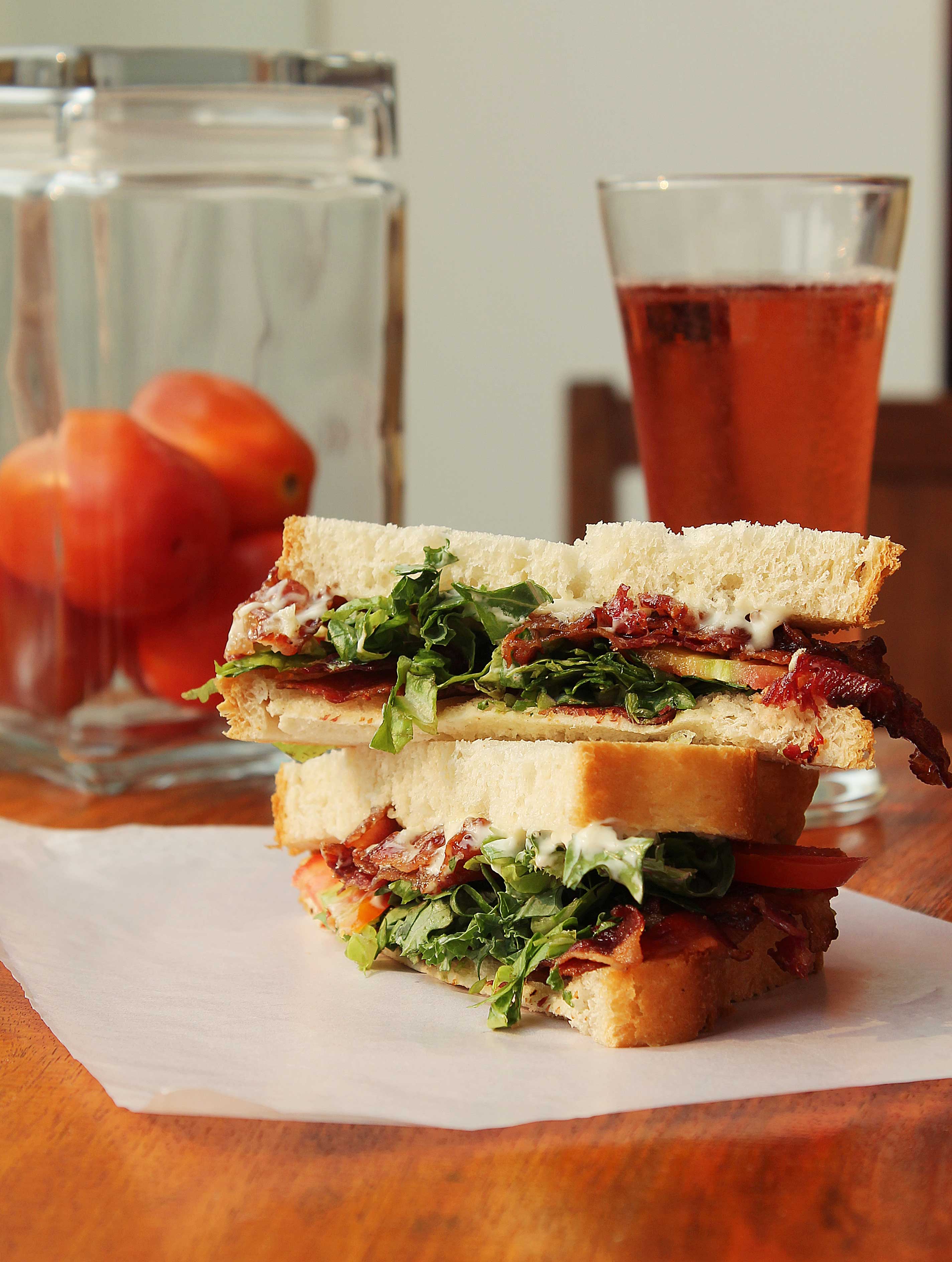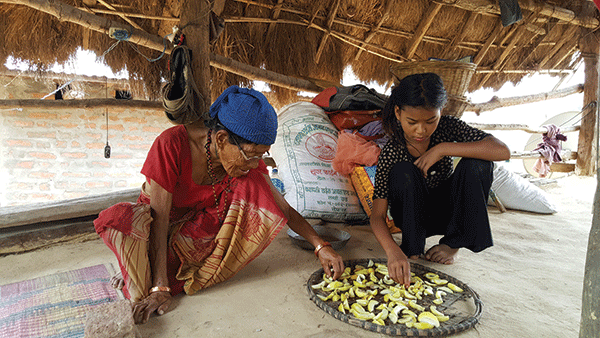“Sailing to Heaven” portrays a former sailboat captain’s experiences and the trials he endures during his summit attempt of Mount Makalu.
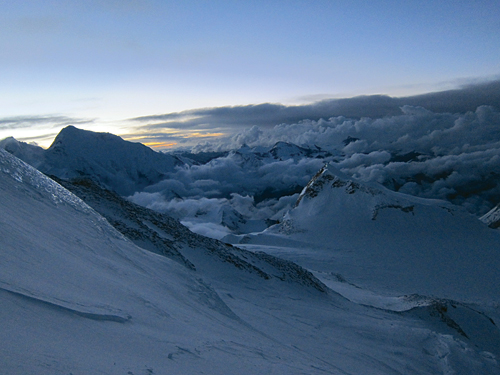 I’m not a mountaineer, nor do I ever intend to be – there’s far too much drama and death involved. I joined this alpinist circus a few years back and have only recently begun to grasp the consequences. Nonetheless, I am irresistibly drawn back for one more try, one more mountain.
I’m not a mountaineer, nor do I ever intend to be – there’s far too much drama and death involved. I joined this alpinist circus a few years back and have only recently begun to grasp the consequences. Nonetheless, I am irresistibly drawn back for one more try, one more mountain.
I first came to Nepal in 1991. We did a one-month trek up to Makalu base camp. I remember thinking at the time that it would be completely insane to go any higher.
Fast forward to last spring 2013-buckled into a helicopter with five others, we barrel through the misty Arun Valley. Hemmed in on either side by sharp impossible cliffs, we descend into Yangri Kharka, a one-hut town with a few chickens and even fewer eggs. The cold air blasts you the second you disembark, a splitting headache hits a couple hours later. We huddle in a smoke-filled room, joking about the endless varieties of dal-bhat that we can look forward to. We’re all here for different reasons bar one: each of us wants to summit Makalu, 8485 meters above sea level, 5th highest mountain in the world. Aside from that I’m guessing most are looking to unlock something inside, to reach a higher playing field in life. I can’t explain exactly why, but I know that I have to get to the top.
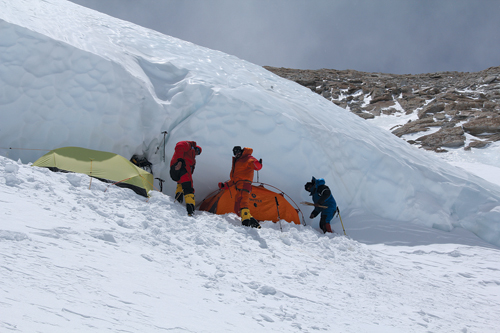 A few days after reaching advanced base camp (ABC) some of us walk solemnly around the desolate moonscape, contemplating memorials of fallen climbers. Plaques and tin barrel tops are engraved with dates and names of those who never returned. A mutilated helicopter blade, another symbol of disaster, lies dejectedly on the ground. People die up here, more than I care to think about. There should be a sign with two arrows, one pointing up labeled “DEATH” and the other pointing down labeled “LIFE.” Each one of us knows that there is a chance that we might not make it back. No one other than myself claims to have a headache…yeah, right. I guess no one is afraid of what we’re about to get into, either. Stories of death and misadventure creep into our dinner conversations like uninvited guests. You’d have to already be dead not to feel the fear.
A few days after reaching advanced base camp (ABC) some of us walk solemnly around the desolate moonscape, contemplating memorials of fallen climbers. Plaques and tin barrel tops are engraved with dates and names of those who never returned. A mutilated helicopter blade, another symbol of disaster, lies dejectedly on the ground. People die up here, more than I care to think about. There should be a sign with two arrows, one pointing up labeled “DEATH” and the other pointing down labeled “LIFE.” Each one of us knows that there is a chance that we might not make it back. No one other than myself claims to have a headache…yeah, right. I guess no one is afraid of what we’re about to get into, either. Stories of death and misadventure creep into our dinner conversations like uninvited guests. You’d have to already be dead not to feel the fear.
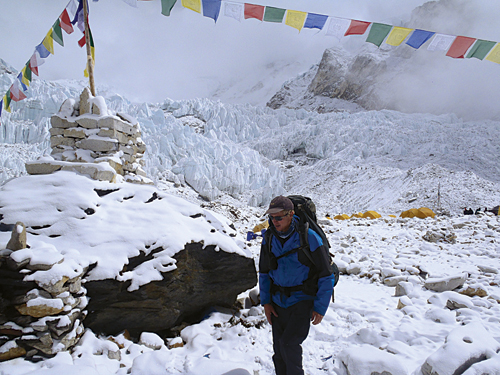 At some point death silently crawls upon your shoulder and waits to reach out and wrap its cold tentacles around you like a deep-sea monster. You feel it every moment, biding its time. Don’t worry, death is patient. Death will wait - it has all the time in the world.
At some point death silently crawls upon your shoulder and waits to reach out and wrap its cold tentacles around you like a deep-sea monster. You feel it every moment, biding its time. Don’t worry, death is patient. Death will wait - it has all the time in the world.
And it seems as if you do, too. Too much time alone with your thoughts that keep spinning round and round like a pinwheel in a gale. A distant cousin, doubt seeps into your mind, haunting ambition. You cannot hide and must confront both or else they will destroy your resolve.
I’m used to a solitary lifestyle. The last twenty years of my life have been spent on and off on the sea, working on everything from commercial fishing boats in Alaska to luxury sailing yachts in the Caribbean. I’m used to the continuous days by myself, the monotony of long voyages, the never-ending game of “hurry up” and “stand by.” Most of the time it’s only you and your thoughts, same as here.
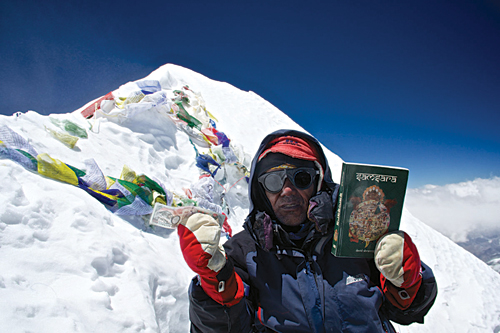 Weather is just as important. Sailors spend as much if not more time scouring weather data as mountaineers, cross-referencing and double-checking as many sources as possible before making a final decision to head offshore. As soon as you drop the lines and sail away into the deep blue water you are at the mercy of the weather. The same holds true the moment you leave base camp and head for higher ground. If a storm hits, you’re in it, for better or worse. Sometimes it feels as if you’re caught in raging sea storm, peaks and ice transformed into massive frozen waves about to crash over you.
Weather is just as important. Sailors spend as much if not more time scouring weather data as mountaineers, cross-referencing and double-checking as many sources as possible before making a final decision to head offshore. As soon as you drop the lines and sail away into the deep blue water you are at the mercy of the weather. The same holds true the moment you leave base camp and head for higher ground. If a storm hits, you’re in it, for better or worse. Sometimes it feels as if you’re caught in raging sea storm, peaks and ice transformed into massive frozen waves about to crash over you.
The first summit attempt began to go pear shaped the moment we left Camp One. Departing too late in deteriorating weather, many of us did not make it to Makalu La until well into the night in snow flurries and gusting winds. Beyond exhaustion, we arrived to find that the Sherpas had only brought three tents for the entire expedition. Six of us had to cram into each three-man tent. Sleeping on top of one another, I managed to squeeze a few hours sleep past the squirming bodies, phlegm hacking and driving winds.
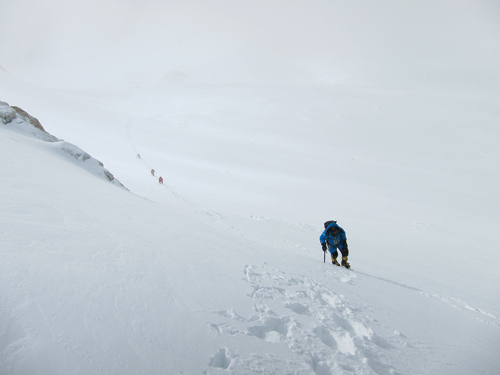 I sensed some of the Sherpas had no intention of going further. Stilted English phrases like, “Too windy, no chance” or “Too early. Not enough rope” floated between the tents like bad omens. Who could blame them when their meager salaries could barely cover family expenses back home? Even so, we strapped on our headlamps and marched off into the long evening rays. Almost everyone wore oxygen masks, immediately sealed off in another world as if scuba diving. This high it doesn’t matter how many Sherpas or how many bottles of oxygen you have them lug along – in the end you’re all alone. If you start thinking that somebody is going to come to your rescue, chances are high that there might be a plaque at ABC with your name on it next year.
I sensed some of the Sherpas had no intention of going further. Stilted English phrases like, “Too windy, no chance” or “Too early. Not enough rope” floated between the tents like bad omens. Who could blame them when their meager salaries could barely cover family expenses back home? Even so, we strapped on our headlamps and marched off into the long evening rays. Almost everyone wore oxygen masks, immediately sealed off in another world as if scuba diving. This high it doesn’t matter how many Sherpas or how many bottles of oxygen you have them lug along – in the end you’re all alone. If you start thinking that somebody is going to come to your rescue, chances are high that there might be a plaque at ABC with your name on it next year.
Black ice on top of fresh snow, a deadly combination, forced us to turn back that night. The next morning some members decided to bail. I weighed the possibility, but after a few hours of semi-sleep reconsidered. It would be four climbers along with some Sherpas. We set off in sunny afternoon skies and low wind. The weather forecast was still favorable for the moment. As the skies darkened we reached the first ice wall. We were the first group up the mountain for the season and had no idea how much rope was still intact from previous expeditions…a big gamble.
Mr. Liu came up behind me with a ski pole in each hand. “Where is your ice axe?” I asked. “Didn’t bring it – don’t need it.” I begged to differ, but there was nothing he could do about it now. Hours passed as the Sherpas tried to locate the route and fix the first ropes. I dug out a trench in the snow and waited…and waited. I was getting a bad feeling. There was too much money on the table with only a pair of Jokers to show for it. It was taking them hours to fix the first pitch and we had no idea what lay ahead. Finally, I began to follow the footprints back and left my cards on the table. Was that it? Would I have another chance to roll the dice?
The next morning, beat up and busted from three days at 7400 meters, I set off for ABC with my Sherpa. No energy left, I pinballed down the mountain, slipping and sliding as I descended. My Sherpa raced further and further ahead, B-lining for the hot plate of dal-bhat that awaited him in the kitchen tent. Completely tapped out at Camp One sans Sherpa, I decided to spend the night there alone as dusk settled in. This would not have been a problem if I had a lighter. No lighter meant no food and, more importantly, no water. I salivated as I stared longingly at the last remaining chunks of ice in my water bottle, cursing my Sherpa and hoping tomorrow would be a better day. Small simple things become so vital at high altitude.
Thoroughly dehydrated, I staggered into a solemn ABC the next morning. Liu was dead. The two climbers and Sherpa who made it to the top returned late in the afternoon, but their grim faces belied triumph. Everyone ate in silence. Liu was dead, another life swallowed by Makalu, nothing more needed to be said. This was the cost that each of us knew might have to be paid. The decision was made that evening to pull the plug. Everyone would be leaving…except me. I had unfinished business with this mountain.
There were now other camps as well, members ranging from exorbitantly rich sons and daughters of Indian socialites sporting extra Sherpas and an endless supply of oxygen to rock star soloists to ancient esoteric Japanese schoolteachers. One camp was chock full of public speakers or “motivators” – it said as much on each one’s flashy business card, just below “Everest Summiteer.” Funny how everyone gets into the motivation business once they summit Everest. I guess it helps cover their mountaineering bills.
Days turned into weeks as the jet stream hovered over the summit like a worried mother, refusing to let go. Quarrels broke out among camps as egos flared and time ticked away. Soon the monsoon would set in – once that happened, all bets were off. I climbed up and down to higher camps, shaving minutes then hours off my original times as my body became more acclimatized. Boredom set in as stacks of books and conversations were exhausted. Nothing to do. Breakfast to Lunch to Dinner to Sleep…do it again. Time… somehow…sometimes…stopped.
And then the day came. I was ready…or so I thought. I had traded in my original Sherpa for another who favored my well-being over a hot plate of dal-bhat. Older, stoic, Dawa resembled a weathered sailor who had seen many a storm. He was all business and only said twenty or so words a day, but each one counted. If things got messy you knew that somehow he would be there, that he would get you out. But who was I kidding? With or without him, I was alone when it came down to it.
As we went up Makalu La one last time, we passed the vanguard who attempted the summit a few days before. A few made it, most did not. Conflicting reports of poor coordination and failure to bring enough rope trickled down the mountain with each passing body. We were the last group to go, the last ones to have a shot at the title.
Dawa and I pitched our tent one hundred meters above the others. We would leave just after midnight. After slurping down one last cup of tea and some noodles, I dug into my thermal cocoon and tried to calm my nerves, popping an Ambien for good measure. This was it…the final push.
Hours later Dawa rustled against me, then fired up the stove. Nothing like a warm cup of butter tea and some tsampa before heading out into a -40 C night…yuck! It took everything I had not to vomit. Altitude diminishes your appetite and it becomes difficult to eat. It took everything I had to force down food and drink that I considered unappealing even in the best conditions! Even so, Dawa claimed it would give me the boost I needed to make it to the top and I was not about to call into question his three previous summits.
Lights flickered in the camp below. Dawa and I muscled on our boots, readied our gear. As we adjusted our crampons, lights drew closer. Only two headlamps…two were not coming. “One of them is sick. Let’s do this!” shouted Sebastiano in his thick Italian accent. Now was no time to dawdle. Navigating up the first ice wall, Sebastiano abruptly doubled over. His Sherpa fretted. “I think I’m out, too. Go ahead, we’ll try and catch up.” We trudged steadily ahead, turning back a few times to watch the headlamps fade into the black.
Now there were only two of us. Doubt seeped into my mind. No time for thinking now, just get up that mountain. As dawn broke I moved to one side to snap a few photos. Suddenly the ground dropped out from beneath me and I was chest deep in a crevasse. I hauled myself onto firm ground with the help of Dawa as he scolded me, vaguely realizing that my life could have ended moments before. That’s all it takes up here, one false move. I could feel death nearby smacking its lips. Don’t worry, it’ll wait.
While climbing you have to know how to turn off the pain and go somewhere else. I dove deep into memories and traveled back in time. Comical childhood stories kept looping through my head as I grinned and chuckled to myself. You also have to learn how to break things into a million little pieces. If you think of heading straight to the top you’ll become overwhelmed. Whittle things down into tiny steps. Clip onto the next rope, make it to the top of the next ridge, check the next ice anchor…baby steps. Sometimes you have to drop down further into micro-increments, like opening a candy bar or changing a camera battery…or breathing. Can’t forget that. Anything beyond this level can be daunting.
The wind increased steadily as Dawa and I edged up over the French Couloir. This is where most of the others turned back. It seemed like we were getting close, but where the hell was the summit? As if reading my mind, Dawa pointed off to a white peak in the distance. A new wave of energy surged through me. I had a visual. Everything became mechanical. Baby steps…keep moving…stop thinking…keep moving.
I crawled up the final pitch, ice axe in hand, to find Dawa huddled down against pummeling winds. “We have to leave – I’m snow blind!” he cried. “Hunchha, ek chin!” After a few quick snapshots we regrouped and retreated. That was it, months of training and planning culminated into a few minutes of glory. The countless hours of preparation, the incessant fear and pain, if only to touch heaven for a moment.
I look back at those pictures now and still can’t believe that I reached the top. Two little specs of flotsam that made it through a violent, frozen ocean and back. Reading about all of the mountaineering disasters that have happened since then have made me aware of just how fragile we are in these deadly places where we don’t belong, but I know I’ll be back. I can’t explain exactly why, but I’ll be back.




